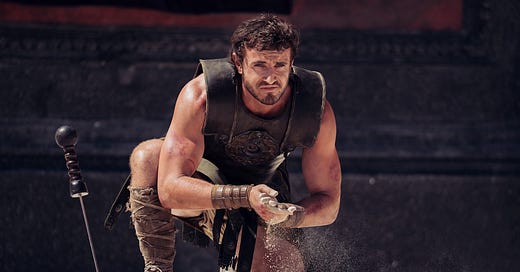'Gladiator II' Labors Under the Tyranny of Legacyquel Storytelling
Twice the Maximus! Twice the Commodus! Half as interesting!
I’m not sure we needed a sequel to Gladiator. The 2000 film is incredibly entertaining, and while I’m not sure it was worthy of a Best Picture win in a year that also gave us Crouching Tiger, Hidden Dragon and Almost Famous, it remains a rip-roaring swords-and-sandals action movie that blends a compelling revenge narrative with the entertainment of fights in the Colosseum. Over twenty years later, it still works wonderfully and arguably better than contemporary action movies that rely on IP and CGI to tell their stories. Sadly, IP and CGI have come for Gladiator, and now we have Gladiator II.
No rule says you can’t make a sequel to an Oscar-winning movie, even if it has a definitive ending. We should also allow creative people to continue telling a story if they have an interesting place to go. Sadly, Gladiator II falls into the same trap as so many other legacyquels, which has become a bland cross-pollination between remake and sequel, but picking up the story decades later with younger cast members. While I won’t pretend that sequels were always dazzlingly original (Die Hard 2 has John McClane say, “How can the same thing happen to the same guy twice?!”) or that the legacyquel formula always fails (Creed is a good example of how to do it right), more often than not, we’re getting reheated leftovers from studios too timid to serve up anything remotely original.
Gladiator II is a retread of Gladiator with a few weird tweaks. The character of Maximus (Russell Crowe) is now split between an adult Lucius (Paul Mescal), who went into exile as a child to survive and is now on the path of soldier-slave-gladiator, and Marcus Acacius (Pedro Pascal), a respected general who wants to return Roman rule to the Senate (the “Dream that Was Rome” did not pan out after the events of the first film for reasons that are never explained). The villain Commodus (Joaquin Phoenix) is also split in two, with Rome now under the rule of co-emperors, brothers Geta (Joseph Quinn) and Caracalla (Fred Hechinger). While Commodus gave audiences the pain of a neglected son striving for the love he would never receive, Geta and Caracalla are never more than sadistic weirdos.
The only major element of the film that feels refreshingly new and interesting is Denzel Washington’s Macrinus. Similar to Oliver Reed’s Proximo in the first movie, Macrinus inhabits the outskirts of the empire and uses gladiators to make his fortune. But whereas there was underlying nobility to Proximo, Macrinus is a pure political animal, and it usually feels like if any character is driving the plot in an exciting direction, it’s him. That’s largely due to Washington being such a force of nature, but also because it feels transported from a different script where the idea of a gladiator is moved from a combat arena to a political one. However, since audiences likely wouldn’t stand for a Gladiator movie that was about political machinations rather than dudes fighting with swords, we get this bizarre amalgam where we’re largely rehashing the first movie with a more interesting narrative off to the side.
Keep reading with a 7-day free trial
Subscribe to Commentary Track to keep reading this post and get 7 days of free access to the full post archives.





